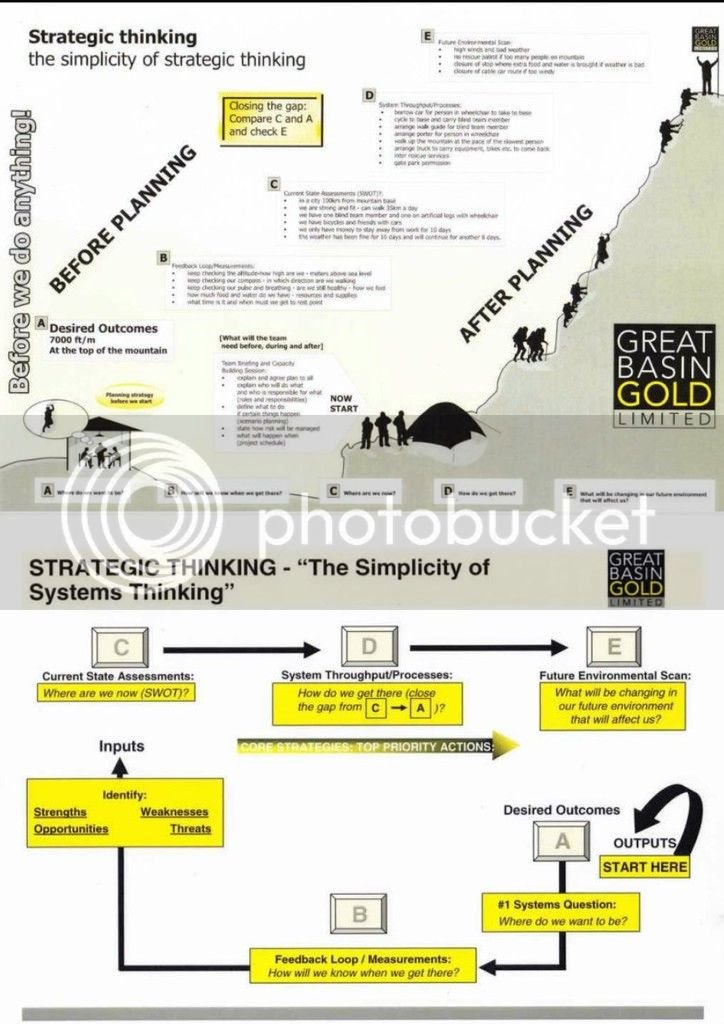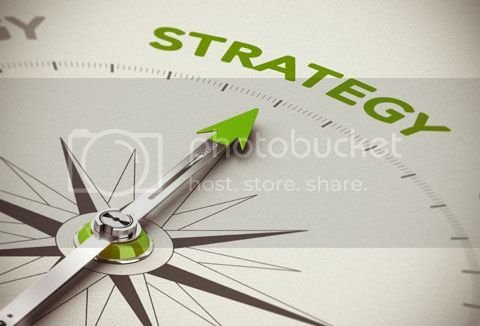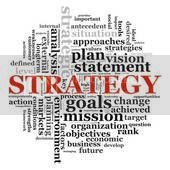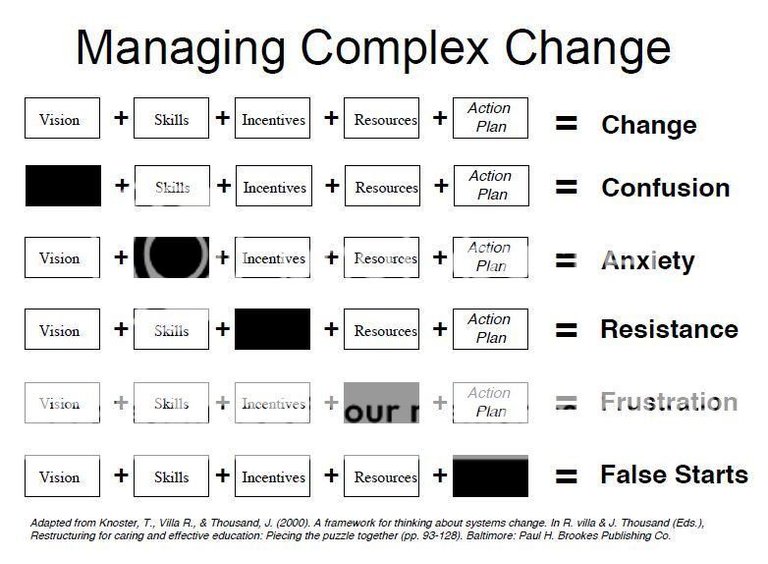I've listened to so much codswallop about strategy over the years that I felt I'd been transported to another world where "they just get it" when I went to visit a Canadian gold mining company investing in South Africa (Great Basin Gold) in the mid-2000s, and saw these two figures:

Attribution: These images are the work of Great Basin Gold (GBG). The fact that I've kept hard copies pasted to whatever wall was closest to my workspace since GBG gave them to me back in 2007 or so doesn't make this thinking any more mine than it was in 2007.
Don't fret over the detail in these two pics, which I must have spent about four hours trying to figure out how to get into a collage you can actually read - kind of. Thank goodness I finally found this kizoa tool. The detail isn't what's important in this post, and in fact that's part of today's message. Strategy isn't about detail; it's about destination and direction. (Get the alliteration?)
Destination and Direction
Of all the quotes by the legendary Zig Ziglar, and you can find many here, this one has resonated with me the most over the last few years: "If you aim at nothing, you will hit it every time."
This sums up my D+D-D approach to strategy - get the Destination and Direction right, and leave the Detail to the planning stage. And before you start howling that a journey without a plan is questionable/risky/idiotic (I agree to varying degrees depending on the proposed journey), I'm not advocating not planning - au contraire! But know what you're planning for. And why. And creating consensus around the two Ds, Destination and Direction, is an exercise in itself. From my observations over the years, this is the point where nearly all strategies go pear-shaped - because creating consensus around a view of the future is hard if you're not used to thinking that way, or have been trained not to.

What constitutes a strategy?
First of all, not a word salad.

Throwing a bunch of words at a wall will not help an organisation understand how it will, in concert with its stakeholders, create value. And that's what a strategy should be about.
A strategy shouldn't be a tactical plan either, but we'll get to that in the next section.
An effective strategy, one that means something to and for an organisation, has to be the result of a real conversation among that organisation's leadership. What should that conversation be about? Can it be structured? Turns out the answer is a surprising yes. I've found this interview with a senior partner from Booz & Company, Ken Favaro, sums it up surprisingly well. I've captured most of it below for those who just want to keep reading and don't want to watch a corporate shirt...and I'd be at risk of defaming him if I commented on how engaging his style is. But what he says is important: a strategy is a set of decisions with respect to five questions:
- What businesses should we be in?
- How will we add value to those businesses, to their performance?
- What [I would say "who", but that's just moi focusing on the human] is our target customer?
- What's the value proposition for those customers?
- What are the capabilities that we need to be distinctive at to deliver that value proposition to those customers?
So the strategy comprises a set of decisions which are made around those five questions.
I liked Mr Favaro's kicker: "The biggest problem in implementing a strategy is not having one."
Is it easy using these questions as a tool to develop strategy?
Leading discussion around those questions, and capturing consensus around "clear, coherent and specific answers" to them, takes true leadership - listening skills are far more likely to get the leadership team to agreement on what the "top of the hill" should look like than bombast or chest-beating. Yet most strategy discussions I've been involved in over the last three decades could be characterised as either HiPPO (Highest Paid Person's Opinion goes) or simply LGO (Loudest Guy's Opinion goes). And the results were predictable - nobody knew where they were going. They only had a better (or more force-fed) idea of where they had already been, and happily took off in the directions they wanted to once the "strategy" was in place.
And before you get too hung up on the words "businesses" and "customers" if the organisation you're strategy-ing for isn't a business, think about them in the broadest sense, as constructs for what you do and who you serve/bring value to. You'll get caught up in questions of business model and stakeholder engagement, or at least you should if the conversation is going deep enough.
Challenges
The biggest challenge I've experienced discussing those questions has been that people naturally focus on their capabilities (think "looking inwards" or more bluntly "navel-gazing") unless they've been trained to focus on value and, er, their clients, so getting them to not skip to question 5 is often amazingly difficult.

But if you're confident that what you're aiming for are the two Ds, Destination and Direction, you'll keep them on track, because as the first image shows...it's great to be at the base of the mountain all kitted out. So what.
The other challenge I've had with groups has been helping them to see the distinction between Question 2 and Question 4 - I see Question 2 as a "what's our business model going to be?" kind of question, where Question 4 is more of a "how well do you know your client's strategy to create value, and how your organisation could fit into it?" conversation. Both are really tricky discussions, especially if the leadership team has never allowed themselves outside the operational or tactical to experience the strategic level. And typically they end up highlighting that most people don't actually understand their company's business model (yikes) or have client focus (double yikes). Anyway, those are my interpretations of Mr Favaro's questions, and they've worked well for me in the past - I'm not wedded to them, so if you've got a better take, I'm all ears!
I've put those questions into action a few times now and can smell when an organisation hasn't really gone through the exercise of deciding on the two Ds. The biggest tell for me: when their "strategy" incorporates financial targets. Busted!

The difference between strategy and execution
Mr Favaro goes on to make a vital distinction between strategy and execution: strategy is about making decisions, and execution is about producing results. He puts some of those word cloud terms into perspective at this point, sharing that leaders have five tools which he dubs the "Corporate 5" to motivate results through execution:
- vision - what do we see for ourselves and the company in the future, and our place in that future?
- mission - what are we trying to achieve as a business?
- purpose - what gives us meaning? What defines why this company exists?
- plan - what are the actions we're going to undertake?
- goals - what are we going to set for ourselves that will define the kind of results we want to achieve?
Vision, mission and purpose are ways to rally people around a shared view of the future and help define the organisation (getting a consensus on those thorny questions, "Who are we?" and "Why are we here?"), and in doing this, motivate performance - so it's important, arguably vital, that the organisation establish these through broad consultation and stakeholder engagement. But not before taking care of the two Ds, Destination and Direction, and not instead of having the conversations on the five strategic questions which lead to decisions on the two Ds.
It's all about value
Those who've followed my winding train of thought on value since I began my Steemit journey will have picked up that I muse about how (and whether) we should measure value (I certainly believe there are better ways to do it than to normalise it to a financial value, but that this falls into the category of a future we could design for ourselves if we decide to), and what it means to different people in different spaces in our world and societies. I'm coming to believe we have a better chance of creating and sustaining value through systemic processes, and a really good shot at destroying it through siloed processes.
It can be powerful to use a framework such as the Six Capitals framework, outlined here, here, here and herePlanetary Boundaries., to develop a shared understanding of the value we are trying to create together with our stakeholders. And some of you may have picked up on @kevinwong's insight that there is a "roundness" to this way of thinking about value creation and sustainability - somewhat like Johan Rockström's depiction of
Such frameworks help us to see interrelationships between groups and systems.
Design-led thinking
Perhaps another way of looking at that hill-climb figure at the beginning of this post is that strategy is about designing for the future, not today. It takes imagination and creativity. It takes an ability to listen to people with different points of view (and maybe who speak different languages) on what conditions will be like when we get to the top, how we even define the top, and whether we all really want to be at the "top" or some other place on the mountainside, or on another mountain, for that matter.
...this will take:
Change Management
So, oddly, it might be necessary to use some tactical techniques to get the leadership team out of a zero-sum, design-based-on-where-we-are-today way of thinking about strategy. Do some of the experiences below resonate with any of you? Especially when it comes to changing decision-making culture, perhaps?

How do I know it works?
Because I've done it, both in business, and climbing a mountain, pole pole, in real life. And because I see others doing it, and I revel in their stories of the light-bulb moments when they get it for the first time. When an engineer, whose brief is to "design", actually delves into her creative self and designs rather than repeats what has been done before. And once they've experienced the power of design-led thinking, will they not be more open to strategy development based on D+D-D, because they've actually lived it already?
And the blockchain in all this?
I'll save most of my thoughts on that for another day, as many of them are still brewing and I need to consult with some bigger brains than mine to connect a few lonely but enticing dots.
Since Integrated Management (IM) and Integrated Reporting (IR) in business are designed to help businesses report on how they are implementing their strategy to create value using forward-looking indicators, rather than using retroactive financial indicators, and govern that process better, the real-time, microtransaction nature of Distributed Ledger Technology (DLT) tells me there has to be a way to revolutionise company reporting (for the better, duh) and therefore improve governance. Don and Alex Tapscott have done much to socialise DLT and potential blockchain applications in the "real" world, and have raised many interesting potential applications for trading in stocks of value differently than we do today.
For me, it all boils down to value, how we perceive it beyond simple Financial Capital, how we shift systemic trades of stocks of value between the Capitals to more sustainable levels (big picture stuff) and how we develop and implement robust strategies to create and trade our little stores of Capital (financial, human, social, intellectual, manufactured and natural) in our organisations and communicate with our stakeholders that we're really on our way to the Destination we decided together, in the Direction we agreed. Surely using blockchain based systems, we'll have better insight into how we are creating and trading those stores of Capital, and thus creating or destroying value.
I found the distinction between a plan and a strategy to be really helpful! I think the permanent nature of the blockchain will lend its self to much better data gathering in markets in general, possibly giving us an even better grasp on market research. I'm sure there are still tons of ways the blockchain will manifest its usefuless in the future. Great article!
Thank you so much for your kind words, @masoyamcha. I really appreciate it when someone makes the effort to read what I've written and engage with it. I know this subject is a bit airy-fairy for a lot of people (especially those I've worked with - lol), but I know there are others like me who are interested in tackling the subject in real life and in idea exchanges such as this who will have valuable perspectives to share, like you.
And indeed, the relationship between the blockchain and Big Data does seem to be coalescing into commercial opportunities already. I don't think we're even at the "early adopter" stage. I'm wondering what kids born after 2030 are going to think - there was a world without the blockchain, Mama?
Great article! I've been also thinking this kind of stuff and how it relates to blockchains.
It's not easy to govern a blockchain. When it's really decentralized, planning becomes quite hard. People come and go as they please, some of them are known only by a nickname. There is usually no real institution built around the blockchain. This makes decision making really hard, as we can see what's happened with Bitcoin, it can't make a decision how to scale even the system is suffering greatly in it's current form.
You might be interested in this article I wrote a couple months ago: Two sides of the blockchain coin: technology and organization
already buy into the integrated management concept, which emphasises forward-looking governance.Thanks for this thoughtful feedback, @samupaha. I agree with you that organisations fully on the blockchain would need to be governed in a completely different way from the way that companies are currently governed - and as you probably know better than I do, there are advocates of the blockchain completely replacing companies. I don't know that I'm fully convinced that would work for the provision of all goods and services currently traded in the world! My point (probably not that well articulated) was more that blockchain based solutions could assist particularly with stakeholder engagement and reporting for those companies which
There's a lot of thinking needed before we get there....
I don't know much about the blockchain and all these different systems but this gave me a good insight into how things can work and especially with this new strategy.
Thanks, @arckrai, appreciate you making the effort to read this post - it makes a difference!
Seems you put a lot of time and effort in your posts. the great thing is you describes your own impressions. I really appreciate these kinds of blogs on Steem.
Thanks, @tzap90. I'm in here for the long haul and want to connect with interesting and interested people. I love how people's curiosity expresses itself, and Steemit seems like such a great place for that to happen. So I honour others' efforts with my own! Now if only I could figure out how to get notified in a timely way when someone I've discovered has posted again. Those original posts tend to get lost in the resteems. I have nothing against resteems but don't want to lose the connections I've already made because of noise....
For what it's worth, my lesson learned was to get everyone behind you they had to choose. Everyone needs to find one's blueprint, and get everything which is not fitting out of the way. This can also mean in extreme cases saying goodbye and finding a different job!
The end goal is always the same: happiness. You start by alligning to everyone to each one happiness and then the bigger picture will come by itself. This has to be repeated by the team often, the sooner if friction is starting to occur.
Alignment is key.
everyone behind you. Someone's there are those who just don't want to do things a different way, and then you have to (often sadly) part ways. A change agent guru once told me that change is like a parade - done know it's coming, and are waiting eagerly for it to arrive; some hear the noise, are curious, come to check it out and maybe stay; others say "Parade? Bah! Humbug! Can't stand this noise!" Don't waste your effort on those guys. Spend time on finding the first group then bringing the second group on board - the first adopters will help you with that.Hi @nutela, great comment (and great handle - yum!). I agree with you on alignment but will have to respectfully disagree on getting
Sure you absolutely right it was more a figure of speech.
Thank you for your insights!
Thanks for your kind words, @k-rapper 🤗
One area where I see block-chain having a strategic impact, and therefore organizations (not just businesses) will need to consider their strategy is in supply chain. My career has been in supply chain and procurement, and for the last few years I was working on global procurement strategy, however I had found that many businesses including ERP tech giants have not really caught up to what block-chain can mean for their organizations.
Supply chains are discrete, disconnected, opaque and unmeasurable. Block-chain tech allows us to start having confirmed evidence of the provenance and origin of goods for example (checkout the UK company Provenance). So imagine if you can go to the supermarket, scan a QR code on a pack of tomatos, and that will get the origin of that indivudual pack, show you the farmers organic certificate and his steemit blog where he tells you his favourite ways to prepare his tomatos; this is a key differentiator not only for the farmer but the supermarket too, but for the farmer he can now get access direct to the consumer market; what strategically are the supermarket going to do with this, are they being disintermediated now, perhaps we can connect directly to the local farmers and get all our produce, especially if someone sets up a decentralized online matching algorithm. What is the supermarkets USP in this emerging structure, do they attempt to block this innovation, or are they a first mover taking market share from their slower moving competitors?
Imagine if your tech products can have every component, sub component and part tracked from source, you now know the rare earth minerals arent from conflict sources. But beyond that the secondary market will be enhanced because you will be able to see how many owners/cycles that device has been through. How will this impact warranty and repairs, you no longer need to go through complex RMA procedures, everthing about your device including repairs is knowable, so now everyone can gather device reliability data and choose producs that fail less; where does tis leave device manufacturers? How willthey strategically cope with that, extended warranties because the data allows them to design better products? Product recalls due to danger in the car industry can be far more efficient and reach down many levels of second hand ownership. Additionally there is possibility to build re-usable components that can be recombined and re-configured into late customizable, or even user customizableproducts, because product warranty can be tracked on a component level. Again, as a business do you fight this innovation, or do you become a first mover?
For international trade we can see dis-intermediation in areas such as customs formalities, as products move through supply chains and the exact make-up of the products is traceable, the documentation required can live with the product itself and remain with it throughout its lifecycle, product valuations will be knowable through smart contracts for sales/procurement and taxes and duties can be levied under smart contracts as well. Governments and regulators will need to consider why border controls exist, and how they will be able to best serve their nations, and if they are even needed in the block-chain era.
Just some of my early thoughts on blockchains and strategy there for you, I hope that helps with whatever you are thinking of for your future blog.
Thank you so much for your thoughtful response, @scalextrix. We've been thinking about similar solutions here - I appreciate the perspective you share on SCM, an important area of value creation - and are impatient for apps to be developed which will facilitate the broader adoption of the technology. Following your blog now and looking forward to sharing ideas with you on how IoT, SCM and ERP solutions could revolutionise how we do business - for the better.
Thanks I'm following you as well, I should probably gather my thoughts and make a post.
Look forward to it!
Hi miss @killigirl .... thanks u so much for such a post ...😂😂😂 yes i got a plan from this post ... i found this post very very helpful for me 😃😃😃 its secret what i learn but really friend as a new comer if any think nd apply in this steem it family i think he could get sucess easily .. ha ha hs ha after all we must learn from nature nd other things from lifec... atleast i always love to be learn miss ... yr mine relate journal is so much tecnical help for me ... thanks again for post ... nd thank god that i follow u ... neve want to miss the valuable posts
You're welcome, @susajustice.